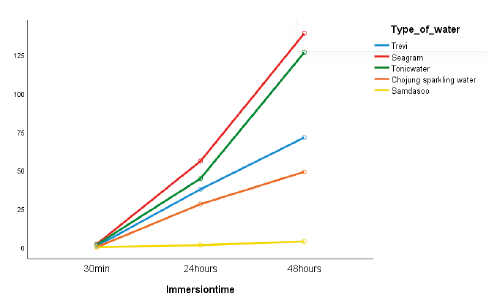Abstract
Objectives: The purpose of this study was to confirm the influence of commercially available carbonated water on denture resin by confirming the changes in the denture surface and adhesion of bacteria. Methods: Carbonated water available in the domestic market was used on specimens made of prosthetic resins. The top four products with respect to sales performance was deposited for 30 min, 24 h, and 48 h over the study groups and over one control group. The surface roughness was measured.
Figures & Tables

Fig. 1. Formation of colonies by time between groups (<0.05)


